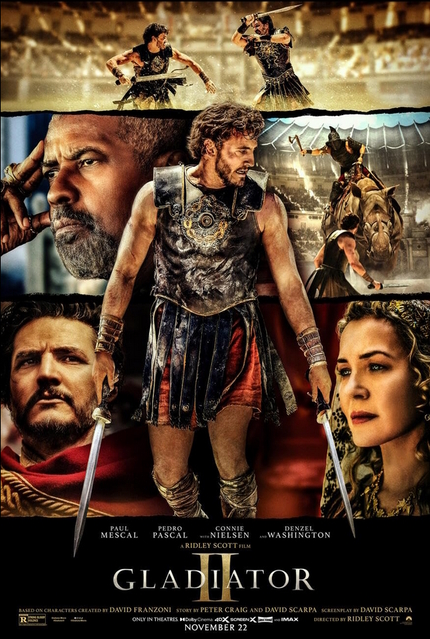GLADIATOR II Review: Ridley Scott Returns to Imperial Rome With Mixed Results

After more than two decades in development limbo, countless rejected drafts permanently memory-holed to studio vaults, and near endless studio dawdling, Ridley Scott (Napoleon, Blade Runner, Alien) seemingly inexhaustible even as his 87th birthday quickly approaches, makes a triumphant return to cinemas with the much mooted, mostly anticipated sequel, the aptly, if inartfully, titled Gladiator II, the sequel to Scott's 2000 endlessly quotable, generationally popular, Gladiator, a historical epic set in Ancient Rome.
With the original title character, Maximus Decimus Meridius (Oscar winner Russell Crowe) the former general turned slave-gladiator, done and dusted at the end of Gladiator, any sequel would have to work around his literal and figurative absence. The former narratively, the latter, thematically.
The part legacy sequel, part remake scripted by Scott's recent collaborator, David Scarpa (Napoleon, All the Money in the World, The Last Castle) confirms what the first film left for audiences to decipher from various hints and clues strewn throughout the film: Maximus fathered Lucius "Hanno" Verus (Paul Mescal, well-cast as Crowe's heir), with Maximus's onetime lover, Lucilla (Connie Nielsen), herself the daughter of Roman emperor Marcus Aurelius (Richard Harris).
When we first meet Lucius, however, he is unaware of his real identity -- or he has chosen to forget it altogether -- living quietly in exile, far from Rome in Numidia, one of the last independent coastal cities. Not for long, of course, as Scott, both mirroring and echoing the earlier film, sets the stage for a set piece pitting Lucius's overmatched defenders against a rapacious Roman army led by Marcus Acacius (Pedro Pascal), a disaffected general exhausted by war. Acacius is chafing at his expected obedience to the undeserving Geta (Joseph Quinn) and Caracalla (Fred Hechinger), co-emperors defined, like Commodus (Joaquin Pheonix) by their cruel, arbitrary, and capricious natures.
Lucius loses everything except his life, but like his far more famous father before him, finds himself thrust into the gladiatorial arena, the blunt, attention-seeking instrument of Macrinus (a gleefully unrestrained, scenery-chewing Denzel Washington), a shrewd, underestimated provincial arms dealer with designs on the throne. Driven by bottomless brooder rage that manifests itself in bloodlust and violence, Lucius allows himself to be used by Macrinus, but only as a means to Lucius's own ends, specifically wreaking havoc and/or revenge on Acacius.
Working from a greatest hits compendium masquerading as a serviceable script, Scott interweaves Lucius's grim, bloody path through the gladiatorial arena with the usual plots, counter-plots, and counter-counter-plots. These are driven into motion by Rome's venal, self-interested senators, some led by Lucilla and Acacius, her current husband, Macrinus, a master of manipulation (and blackmail), and the badly overmatched co-emperors.
A goal in and of itself, the pursuit of power, specifically the throne and the Roman Empire, proves to be the downfall of many if not all. Thematically, that's nothing new, of course, but it remains relevant, if not evergreen. All empires, even nominally democratic ones, fall. Some dissemble into their constituent parts and survive as shadows or ghosts of their former selves like the British, German, or French empires. The eventual fate of others, like the American one currently in distress, remains to be seen.
While Gladiator II rarely strays from its predecessor, treating the 2000 film like sacred, sacrosanct text that must be followed in most particulars, functioning primarily as a vehicle for nostalgia than a standalone film, when it does break away, in its depiction of an empire on a slow, inevitable slide into oblivion, an easily swayed political class, and the inherent fragility of political institutions, it functions as an object lesson and a cautionary tale. As before, the Roman Colosseum, the circuses in the familiar "bread and circuses" formulation functions as a potent metaphor for 'to keep the masses fed and entertained while we plunder and rule' axiom that has kept kings, emperors, and politicians in power for millennia.
As with Scott's previous historical epics, Exodus: Gods and Kings, Kingdom of Heaven, Gladiator, themes, ideas, and even their narrative execution matter significantly less to contemporary audiences than the sheer mastery of a big-scale set piece. Scott displays a combination of skill and talent matched by few other filmmakers, living or deceased. And here he equals some of the best work of his career, from the opening coastal battle through the multiple forays into the gladiatorial arena (minus, alas, the occasionally dodgy CGI) and everything in between; including the detail-rich reconstruction of Ancient Rome and the Roman Empire.
Gladiator II opens theatrically on Friday, November 22nd, via Paramount Pictures.
Gladiator II
Director(s)
- Ridley Scott
Writer(s)
- David Scarpa
- Peter Craig
- David Franzoni
Cast
- Connie Nielsen
- Paul Mescal
- Denzel Washington







